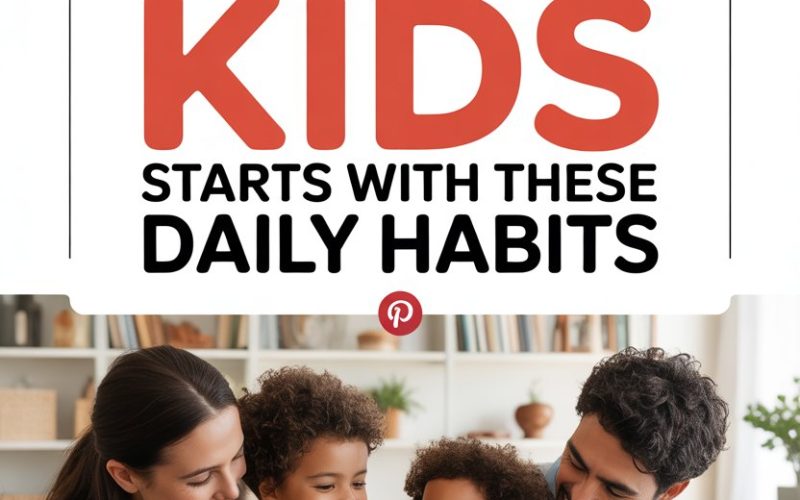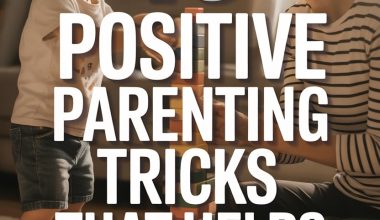Ever notice how your best parenting moments rarely happen when everyone’s smiling for a photo?
That’s because happiness isn’t a finish line, but the sum of small, sticky-fingered, often-chaotic moments scattered throughout every day.
The good news: you don’t need a Pinterest-perfect routine or an abundance of free time to raise happy kids—you just need a few daily habits that fit right into the madness.
Start With Genuine Connection
Kids can sniff out distracted parenting like bloodhounds with a nose for ignored screens. Even if you only have ten minutes before dinner explodes into kitchen chaos, devote those minutes to being truly present with your child.
Make eye contact while they recount the epic saga of their lunchtime banana. Put your phone somewhere you can’t accidentally check it.
A 2020 study from the University of Essex showed that even short bursts of full attention can strengthen a child’s sense of belonging and security.
No, you don’t have to love every tale about Minecraft or unicorns, but showing them you care about their world works wonders for their mood (and eventually, for yours).
Keep Routines Comfortably Predictable
Now, no one’s suggesting you schedule life down to the minute. That’s a fast track to never seeing the bottom of your laundry basket again.
Still, children thrive on knowing what to expect. Morning and bedtime routines, meal times, and even rituals like brushing teeth together or sharing a nightly story offer a comforting rhythm.
Predictability helps kids feel safe. Psychologists have long noted that children with consistent routines experience less anxiety and demonstrate more self-regulation.
If you’re more “organised chaos” than “military precision,” that’s fine—the key is having some repeatable anchors in your day.
Encourage Play—The Messy Kind
Play isn’t just for keeping kids from climbing the curtains (although it does help). Unstructured play—drawing, pillow fort-building, outdoor mud pie artistry—boosts problem-solving skills, emotional intelligence, and resilience.
Child development experts at Harvard’s Center on the Developing Child agree that free play is essential for building a healthy brain.
Yes, you’ll sometimes end up with glitter in places glitter should never go. Small price.
Model Emotional Honesty
Feel like hiding your stress behind a frozen smile? Turns out, kids are emotional detectives who pick up on even the subtlest hints.
Demonstrate how to name and manage feelings—yours and theirs. “I’m feeling frustrated because I spilled my coffee again.
I’m going to take a moment before I clean it up,” teaches emotional regulation far better than “Mummy’s fine!” through gritted teeth.
Researchers have found that children whose parents model and label emotions openly are more likely to develop healthy coping skills themselves.
Bad days happen. Sharing them (in age-appropriate terms) helps turn emotional storms into teachable moments.
Prioritise Sleep—Yours and Theirs
It’s no secret that tired kids transform into pint-sized gremlins. Sleep is the not-so-secret sauce behind good moods, learning, and immune systems that actually stand a chance at soft play centres.
A study in the journal Sleep reported that children who get enough rest show better emotional regulation and social skills.
Even if you can’t master the “perfect bedtime,” aim for a consistent wind-down routine. Consider calming music, dimmed lights, and a ban on screens for 30 minutes before lights out.
And while you’re at it, try not to sacrifice your own sleep every night—it’s hard to model happiness when you’re running on caffeine and wishful thinking.
Show Affection and Appreciation Often
A quick hug. A high-five for trying broccoli. A sticky note in the lunchbox that says “You’re brilliant!”—little demonstrations of affection add up.
According to a review in Child Development, children whose parents express warmth and appreciation experience greater well-being and are less likely to act out.
You don’t need to smother them with praise for every breath. But catch them being kind, persistent, or just delightfully themselves, and celebrate it out loud.
Foster Independence in Small Steps
Happy kids feel capable. That doesn’t mean tossing the car keys at your seven-year-old, but it does mean trusting them with small responsibilities.
Letting them choose between two outfits, pour their own cereal, or feed the cat builds confidence and resilience.
Developmental psychologists advocate for what’s called “scaffolded independence”—supporting children just enough so they stretch into new skills without feeling overwhelmed.
Sure, you’ll sweep up more spilled milk, but you’ll gain a child who believes in their own abilities.
Eat Together When You Can
Family meals—whether it’s dinner or a quick snack at the bench—are about so much more than calories. These moments anchor children, foster conversation, and provide a natural time to share what’s on everyone’s mind.
A study by the American Academy of Pediatrics found that regular family meals are linked to better mental health, stronger vocabularies, and even lower rates of risky behaviour in teens.
Don’t fret if you can’t manage a home-cooked spread every night; fish fingers and beans absolutely count.
Open Up Space for Their Voice
You know those endless “why” and “how come” questions? As exhausting as they can be, they’re also a child’s invitation to be heard.
Regularly ask for your child’s opinion—even about small things. “Which park should we visit?” or “How did maths go today?” signals that their perspective matters.
Harvard’s Making Caring Common project found that children who feel listened to by adults are more likely to develop empathy and self-esteem.
Even if you can’t grant every wish, just hearing them out makes them happier.
Find Moments to Laugh Together
A little silliness does more for family bonding than any lecture on gratitude or “using our indoor voices.” Tickle fights, silly socks days, impromptu dance parties—these don’t take much time, but they turn an ordinary Tuesday into a memory.
Psychologist Lawrence Cohen, author of Playful Parenting, notes that families who laugh together build resilience and trust. Plus, the sound of your child’s giggle might just be the best stress-reliever on offer.
Encourage Gratitude and Kindness
Happiness isn’t a solo pursuit. Children who practise kindness and gratitude feel more positive emotions and are better equipped to handle life’s bumps.
You might start a gratitude ritual at dinner, or encourage them to help a friend. When kids see generosity and thankful hearts modelled daily, it becomes part of their DNA.
Research, including a 2019 study from UC Davis, shows that gratitude boosts happiness and mental health for kids and adults alike. The trick? Keep it simple, authentic, and pressure-free.
Let Boredom Breathe
Next time a small person whines, “I’m boooored,” resist the urge to leap in with entertainment. Boredom is the birthplace of creativity.
When kids have space to sit with their own thoughts, they begin to invent, imagine, and problem-solve.
Psychologists from the University of East Anglia have found that children actually benefit from periods of unstructured time. Treat boredom as a blank canvas, not a crisis. (And hey, who knows? You might get five minutes of peace.)
Keep Your Own Joy in the Mix
Happy parents are more likely to raise happy kids. Not happy in a Stepford Wives way—but in the sense that you carve out time for your interests and friendships, too.
Children learn what joy looks like by seeing their adults enjoy life, not just manage it.
Even if it’s just a catch-up over coffee with a mate, or blasting your favourite song while folding the washing, small acts of self-care have ripple effects.
A study in Pediatrics cited parental well-being as a key predictor of children’s mental health.
Why These Habits Matter More Than Perfection
Nobody gets it right every day.
The good news: your children don’t need a flawless parent, just a loving one who keeps showing up, even on the messy days. A few consistent, caring rituals matter far more than the occasional grand gesture.
These daily habits, stitched into the fabric of family life (and probably held together by dog hair and biscuit crumbs), offer the security and joy kids need to thrive.
And if all else fails—there’s always tomorrow to try again.
Happiness, after all, is just a little bit contagious. Why not start at home?




